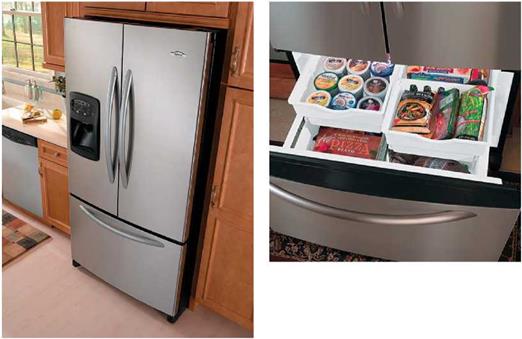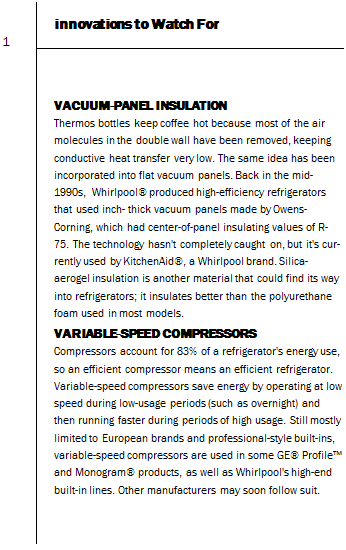Style and Use Determine Efficiency
WHAT TO AVOID


• Through-the-door ice and water dispensers. Both the lost insulation and the additional cooling coils in a through – the-door ice and water dispenser increase electricity consumption.
•  Automatic ice makers. Ice makers consume energy, though exactly how much is difficult to determine.
Automatic ice makers. Ice makers consume energy, though exactly how much is difficult to determine.
• The Energy Star label. The U. S. Environmental Protection Agency confers its Energy Star label on models that are at least 20% more energy efficient than the federal minimum. Shopping for this label is an easy way to be sure the refrigerator you choose is not an energy waster.
• Freezers on top or bottom. Side-by-side refrigerators use more energy.
• Manual defrost cycles. The most energy – efficient refrigerators and freezers
have manual defrost, although they can be hard to find, particularly among high – end models.
• Door alarms. Some manufacturers offer an alarm that will sound if the fridge door is left open—helping to save energy and to prevent food spoilage.
• Place fridges away from heat sources—
especially a range or oven, but also a dishwasher. Radiant heat from these appliances warms the surface of the fridge, requiring more energy to keep the inside cool. If the refrigerator must be adjacent to a heat source, provide space for air circulation.
• Clean the coils, at least annually. Dust and dirt buildup on refrigerator/freezer coils reduces the heat-exchange efficiency and makes the compressor work harder. Most refrigerators now have coils that can be accessed from the front, eliminating the need to pull the unit away from the wall.
• Turn off the condensation-control feature. Essentially, these are heating elements under the protective shell that consume energy in two ways: by using electricity to warm the outer shell and by increasing the difference in temperature across the unit’s insulation. Models with
this feature usually have a switch to turn it off; do so, unless condensation becomes a problem.
• Keep the freezer full. Frozen food serves as a thermal stabilizer that reduces the amount of on-off cycling. If you don’t have a lot of frozen food, freeze containers of water (use plastic, and allow for expansion as the water freezes) to take up the extra space. When you need ice for a cooler, you can use these frozen containers.
• Don’t keep an extra fridge in the garage.
When you buy a new refrigerator, avoid the costly mistake of keeping the old one as a backup.






Leave a reply